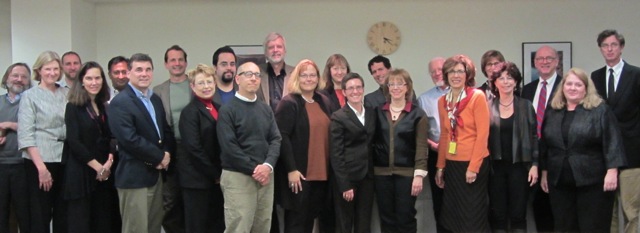 Whether they manage bits for their local historical society or the Library of Congress, the digital era has placed added demands on today’s curators. The growing need for training in these new skills is one of the motivations for the University of Maine’s just-launched Digital Curation graduate program, but U-Me is not alone in recognizing this need.
Whether they manage bits for their local historical society or the Library of Congress, the digital era has placed added demands on today’s curators. The growing need for training in these new skills is one of the motivations for the University of Maine’s just-launched Digital Curation graduate program, but U-Me is not alone in recognizing this need.
On January 8th a Digital Curation summit in Washington, DC, brought together educators from U-Me together with the first wave of digital curation programs to meet with professional curators, librarians, and archivists from nationwide institutions with the aim of defining the knowledge and skills needed by today’s information caretakers.
Organized by Peter Botticelli of the University of Arizona and Phyllis Hecht and Joyce Ray of Johns Hopkins with Michele Cloonan of Simmons, the summit included curators and librarians from the Smithsonian, Art Institute of Chicago, National Archives, and Library of Congress, as well as additional educators from UNC, Illinois, and Maryland.
 Some participants, such as Emily Gore of the Digital Public Library of America, represented repositories eager for digital content. Others, like Sayeed Choudhury of Hopkins, sat on the other side of the firehose. Choudhury explained how astronomers today generate a petabyte of data every 10 hours–a glut of data that requires new paradigms for publication. Choudhury described science’s new approach to research data as “publish first and clean up after.”
Some participants, such as Emily Gore of the Digital Public Library of America, represented repositories eager for digital content. Others, like Sayeed Choudhury of Hopkins, sat on the other side of the firehose. Choudhury explained how astronomers today generate a petabyte of data every 10 hours–a glut of data that requires new paradigms for publication. Choudhury described science’s new approach to research data as “publish first and clean up after.”
Bill Moen of the University of North Texas called for alternative credentialing systems for curators. Moen and U-Me’s Jon Ippolito held up digital badges as a system that is more fine-grained and/or interdisciplinary than traditional degrees. U-Me’s online tutorials for Digital Curation and other subjects already use such a badging system, building on research by Still Water’s John Bell.
Ippolito promoted the idea of crowdsourced curating, a strategy analyzed in his upcoming book with Richard Rinehart Re-Collection. Pamela Wright, Chief Innovation Officer at National Archives And Records, described a “Citizen Dashboard” that allowed Internet visitors to transcribe handwritten documents. Wright’s team had expected progress to take months or years, but three-quarters of the texts were already transcribed by end of the first week–and in some cases translated.
In response to a question about the quality of crowdsourced projects like this, Wright described one of her students “correcting” a misspelling in one of the documents, only to be admonished by the crowd that the correct archival practice is to leave the misspelling in place.

Three-dimensional scanning offered other examples of crowdsourcing cited by the assembled participants, including Erin Coburn’s 3d “scanathan” at the Metropolitan in collaboration with Makerbot.
3d fabrication can also help repatriate objects taken from specific communities, sometimes with surprising results. The Smithsonian’s Gunter Waibel described an Alaskan tribal leader who needed to pass on the ritual duties associated with an orca-shaped hat, but whose health was failing too quickly to wait for the full repatriation process. In response, a replica of the killer-whale hat was scanned from the original, milled, and repainted by an artist, and sent to the tribe to be used in the ceremony.
Since then, Waibel reported, the Smithsonian has heard from native communities who would prefer to use the replica and keep the original in a museum. (While it confuses traditional Euroethnic understandings of authenticity, this choice resonates with Joline Blais’ analysis of the Malanggan.)

RT @stillwaternet: DC in DC, with @DigitCurator, @jonippolito: “Digital Curation summit asks, what do today’s curators need to know?” ht …
RT @stillwaternet: DC in DC, with @DigitCurator, @jonippolito: “Digital Curation summit asks, what do today’s curators need to know?” ht …
RT @stillwaternet: DC in DC, with @DigitCurator, @jonippolito: “Digital Curation summit asks, what do today’s curators need to know?” ht …
RT @stillwaternet: DC in DC, with @DigitCurator, @jonippolito: “Digital Curation summit asks, what do today’s curators need to know?” ht …
RT @stillwaternet: DC in DC, with @DigitCurator, @jonippolito: “Digital Curation summit asks, what do today’s curators need to know?” ht …